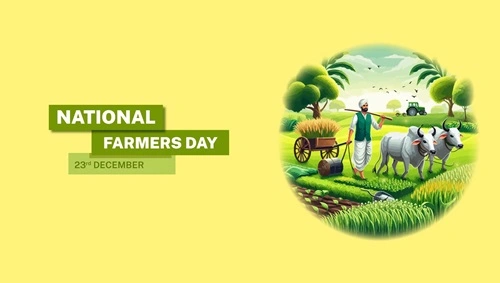Farmers’ Day, or Kisan Diwas, is celebrated every year on December 23rd in India to honor the invaluable contribution of farmers to the nation. Agriculture has been the backbone of India’s economy for centuries, employing nearly 60% of the population and contributing significantly to the GDP. Farmers’ Day is a tribute to the relentless hard work and dedication of the farming community, which plays a vital role in ensuring food security and economic stability.
The date, December 23rd, marks the birth anniversary of Chaudhary Charan Singh, India’s fifth Prime Minister, who was a strong advocate for farmers’ welfare and agricultural reforms. Kisan Diwas is a day to reflect on the challenges faced by farmers, appreciate their efforts, and emphasize the need for reforms to support the agricultural sector. Let’s dive into everything you need to know about Farmers’ Day in India, including its history, significance, and celebrations.
History of Farmers’ Day in India

Farmers’ Day was established to recognize and celebrate the birth anniversary of Chaudhary Charan Singh, born on December 23, 1902, in Uttar Pradesh. Charan Singh was not just a prominent political figure but also a leader who dedicated his life to addressing the concerns of farmers and rural communities. His tenure as Prime Minister (from July 28, 1979, to January 14, 1980) was marked by several initiatives aimed at improving the agricultural sector and uplifting farmers.
Contribution of Chaudhary Charan Singh
1. Focus on Agricultural Reforms: Charan Singh strongly believed in empowering small and marginal farmers. He introduced policies to abolish the zamindari system and ensured fair land distribution.
2. Advocate for Rural Development: He emphasized the importance of rural development for the overall growth of the nation and worked towards providing better facilities for villages.
3. Kisan Trust: To promote the interests of farmers and amplify their voices, Charan Singh founded the Kisan Trust in 1978.
Recognizing his unwavering commitment to the agricultural community, the Indian government decided to honor his legacy by celebrating Kisan Diwas on his birth anniversary every year.
Significance of Farmers’ Day
Farmers’ Day holds immense importance in India, where agriculture is not just an occupation but a way of life for millions of people. The day is significant for several reasons:
1. Acknowledging Farmers’ Contributions
Farmers are the backbone of India, producing food for the nation and supporting the economy. Kisan Diwas is a day to appreciate their efforts and recognize their critical role in society.
2. Highlighting Agricultural Challenges
Farmers’ Day serves as a platform to discuss the issues faced by farmers, such as debt, low crop prices, lack of modern equipment, and climate change. It reminds policymakers and the public of the need to address these challenges.
3. Promoting Agricultural Development
The day emphasizes the importance of adopting innovative farming techniques, ensuring access to modern technology, and supporting sustainable agricultural practices to improve productivity.
4. Inspiring the Next Generation
Kisan Diwas also aims to inspire the younger generation to take an active interest in agriculture and work towards transforming the sector with new ideas and technologies.
Challenges Faced by Indian Farmers
While agriculture remains a significant sector in India, farmers continue to face numerous challenges that hinder their progress.
1. Debt Burden
Many farmers, especially small and marginal ones, struggle with loans due to high input costs and low returns on crops. This financial pressure often leads to distress.
2. Climate Change
Unpredictable weather patterns, including droughts, floods, and unseasonal rains, affect crop yields and livelihoods.
3. Lack of Modern Technology
Many farmers still rely on traditional farming methods due to limited access to modern machinery, irrigation systems, and scientific knowledge.
4. Market Inefficiencies
Farmers often do not get fair prices for their produce due to middlemen, inadequate market infrastructure, and fluctuating demand.
5. Land Fragmentation
As land is passed down generations, it gets divided into smaller plots, making large-scale farming and mechanization challenging.
Government Initiatives for Farmers
Over the years, the Indian government has introduced several schemes and initiatives to support farmers and improve the agricultural sector.
1. Pradhan Mantri Kisan Samman Nidhi (PM-KISAN)
Under this scheme, financial assistance of ₹6,000 per year is provided to small and marginal farmers to help them meet agricultural expenses.
2. Pradhan Mantri Fasal Bima Yojana (PMFBY)
This crop insurance scheme protects farmers against losses due to natural calamities, pests, and diseases.
3. Soil Health Card Scheme
Farmers receive soil health cards that provide information about the nutrient content of their soil, helping them optimize fertilizer use.
4. Kisan Credit Card (KCC)
The KCC scheme provides short-term credit to farmers at low interest rates, enabling them to purchase inputs like seeds, fertilizers, and equipment.
5. E-NAM (National Agriculture Market)
This digital platform connects farmers with buyers, ensuring better prices for their produce and reducing the role of intermediaries.
6. Paramparagat Krishi Vikas Yojana (PKVY)
This scheme promotes organic farming and sustainable agricultural practices to ensure long-term soil health and environmental conservation.
Celebrations of Farmers’ Day
Farmers’ Day is celebrated with great enthusiasm across India, particularly in rural areas. Various events and programs are organized to highlight the importance of agriculture and honor farmers.
1. Seminars and Workshops
Educational programs are conducted to raise awareness about modern farming techniques, sustainable practices, and government schemes.
2. Felicitation Ceremonies
Outstanding farmers who have made significant contributions to agriculture are recognized and rewarded for their efforts.
3. Awareness Campaigns
Campaigns are organized to educate farmers about their rights, available resources, and innovative farming solutions.
4. Cultural Programs
In rural areas, cultural events like folk songs and dances are held to celebrate the agricultural heritage of India.
5. Discussions and Debates
Farmers, experts, and policymakers come together to discuss the challenges in the agricultural sector and propose solutions to improve it.
Role of Farmers in Nation-Building
Farmers play a pivotal role in the development of the nation. They not only ensure food security but also contribute to industrial growth by supplying raw materials like cotton, sugarcane, and jute. The agricultural sector generates employment opportunities and supports rural economies, making it a key driver of progress.
However, it is crucial to recognize their efforts and provide them with the resources and support they need to thrive. Farmers’ Day serves as a reminder that a nation can truly prosper only when its farmers are empowered.
How You Can Support Farmers
As citizens, we can contribute to the welfare of farmers in several ways:
1. Buy Local Produce: Supporting local farmers by purchasing their products helps boost their income.
2. Spread Awareness: Share information about farmers’ struggles and initiatives to create a more informed society.
3. Volunteer for NGOs: Many organizations work for farmers’ welfare. Volunteering for such groups can make a difference.
4. Advocate for Policies: Raise your voice in support of policies that benefit farmers and promote agricultural development.
Conclusion
Farmers’ Day, or Kisan Diwas, is not just a day to honor Chaudhary Charan Singh and the farming community but also a time to reflect on the challenges faced by farmers and take steps to support them. Agriculture remains the heart of India, and the prosperity of the nation is deeply tied to the well-being of its farmers.
As we celebrate Farmers’ Day on December 23rd, let us remember the hard work, resilience, and dedication of the millions of farmers who ensure that we have food on our plates. Supporting them is not just a responsibility—it is a duty we owe to those who feed the nation.

